- Startseite
- Ressourcen
- CNC Machining Alloy Steel: Process, Types, Tips
CNC Machining Alloy Steel: Process, Types, Tips
CNC machining is an accurate method that uses computer-controlled machines to extract material from the workpiece. This technique guarantees high validity, durability, and stability for industrial components. It joins advanced CNC technologies like milling and turning to achieve advanced shapes.
This article will explain to you the basics of alloy steel, the process of machining, the advantages, the limitations, the post-processing ways, and useful hints that help one in getting great results in CNC machining of alloy steel.
Was ist legierter Stahl?
Alloy steel is created by combining iron and alloying elements. Like nickel, chrome, vanadium, and molybdenum, to the mixture. The alloying actions help improve strength, resistance to corrosion, and durability. Alloy steel is also used in the automotive, aerospace, and construction industries.
Alloy steel provides high mechanical stability and outstanding performance. Making it the best choice in critical applications requiring toughness and long-lasting wear resistance.
CNC-Bearbeitung von legiertem Stahl
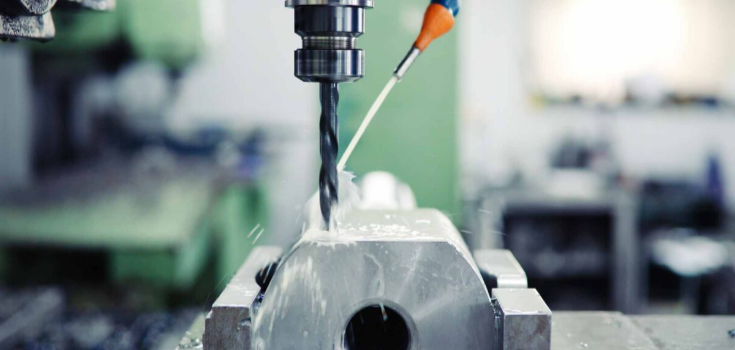
CNC machining alloy steel depends on a computerized tooling mechanism. It creates parts with great accuracy and detail, along with producing high-performance end products. Computer-aided tools cut metals layer by layer. It allows the manufacturer to control tighter tolerances and duplicate the designs.
Surface finish, repeatability, and dimensional precision are confirmed while using this process. The two critical methods come into play under CNC machining. CNC milling and CNC turning shape, refine, and effectively finalize the alloy steel components.
CNC-Fräsen
The motion is provided by the CNC lathe that moves to rotate the tool. It also creates a new shape of a stationary workpiece. This technique works perfectly for a detailed component and design. High-speed steel tools or carbide tools should be used for milling alloy steel since they are tough.
Coolants reduce the heat generated during machining, minimizing friction and creating a smoother surface with tighter tolerances. It increases durability and accuracy in a final component.
CNC-Drehen
CNC turning consists of rotating a workpiece around a fixed cutting tool. CNC Turning usually gives very highly symmetrical external parts like shafts, rings, and valves. Dimensional accuracy is guaranteed because this process produces a very smooth surface.
High-strength setups with carbide tooling and constant cooling are useful to manage temperature. This process creates parts into cylindrical components using mixed methods, applying high-alloy steels.
Arten von legiertem Stahl
Niedrig legierter Stahl
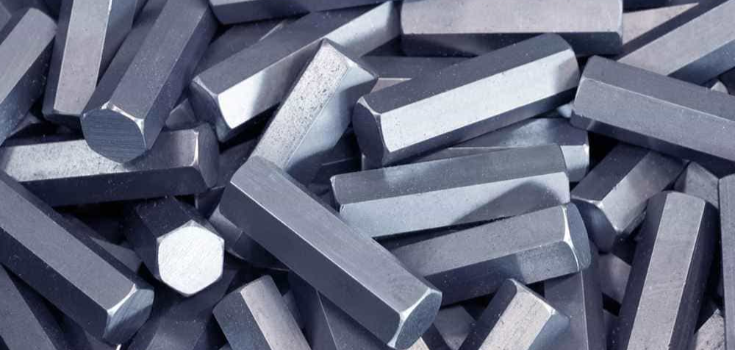
Low alloy steel is defined by the inclusion of less than 5% of alloying elements. Their strengths, weldabilities, and impact resistances have a common ground. Grades such as 4130, 4140, and 4340 are used in applications for machinery, construction, and pipes.
Hochlegierter Stahl
Around 5% of alloying elements are present in high alloy steel. Rostfreier Stahl grades such as 304 and 316 have high levels of heat, corrosion, and wear resistance. It makes them applicable for aerospace, chemical, and marine environments.
Martensitaushärtender Stahl
Low in carbon but high in nickel. Maraging steel achieves ultra-high strength through heat treatment. Making this steel a model for tooling, aerospace, and defense equipment.
Werkzeugstahl
Tool steel is one of the leading steels in terms of hardness and heat resistance. Cutting or forming operations do not lose much toughness. It makes them ideal for dies, molds, or machining tools.
Benefits of CNC Machining Alloy Steel
Kundenspezifische CNC-Teile aus legiertem Stahl

CNC machining alloy steel offers countless benefits. It is a preferred method of choice in producing precision-engineered components. Milling and turning operations are combined to create parts that achieve the stringent mechanical and structural requirements.
Verbesserte Langlebigkeit und Stärke
Alloy steel is highly resistant because of its mechanical properties and hardness. Using CNC machining, these properties are retained in the finished product. These can withstand high loads and offer resistance to friction and wear.
The alloy steel-made components are perfect for high-stress environments where performance over time becomes just as important.
Hohe Präzision und Genauigkeit
CNC machining stands out in terms of high accuracy. It is a basic requirement in manufacturing parts with close tolerances and complex geometries. Advanced methods of milling and turning are used to ensure all possible dimensions conform to the design.
This process of accuracy is essentially required in aerospace, automotive, and machinery applications that depend on uniformity and reliability.
Consistent Component Quality
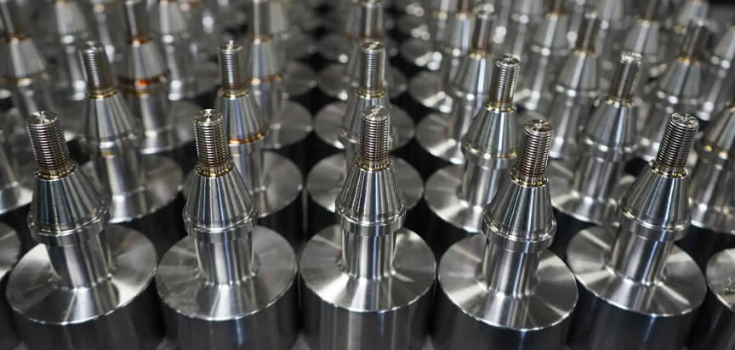
CNC machining is an automated process that guarantees repeatability with uniform quality. Once the process is programmed, hundreds or thousands of identical parts can be produced with very little variation.
Such consistency takes away human error, and a few cuts that cut down production costs. It ensures that alloy-steel components can be mass-manufactured fast and efficiently.
Versatile and Flexible Process
One of the finest features of CNC machining is that multiple processes can be combined, milling and turning, for example, within a single setup. It allows manufacturers to create parts with complex shapes, advanced detailing, and various surface finishes.
Another advantage is its easy transition from prototyping to very large production lots, giving flexibility with different industrial needs.
Hervorragende Oberflächengüte
CNC machining of alloy steel makes very smooth cuts with excellent surface finish. The surface finish is due to high-quality tooling in combination with cutting speeds and cooling technique control.
The additional benefit is that very little post-processing is needed. Thus saving time and money for a professional finishing look that aids in the part's functionality and appearance.
Limitations for CNC Machining Alloy Steel
CNC-Bearbeitung von legiertem Stahl
The CNC machining of alloy steel provides accuracy and performance. Some issues may need to be addressed during production. These limitations impact the project costs, speed, and way of machining, especially for complicated or large parts.
Hohe Kosten

Alloy steel has a higher price bracket than basic carbon steels because the addition of alloying elements like chromium, nickel, and molybdenum. These alloys basically improve the material's mechanical strength and increase the costs regarding raw materials and tools.
The cost-attentive projects may consider the high cost of machining alloy steel as a critical factor.
Difficulties in Machining
Due to its essential toughness, it faces difficulty in machining. The hardness of alloy steel results in severe tool wear, leading to tool replacements or regrinding of cutters quite frequently.
To minimize the wear and match on the grounds of productivity and accuracy. CNC machinists would resort to advanced carbide tooling and optimized cutting speeds.
Restriction in Layout
Although CNC machining is flexible, some larger or excessively complex designs made from alloy steel may exceed these equipment's limits of capacity.
The hardness of the material and the reach limitations of the tool can hinder machinable geometry. It makes it nearly impossible to achieve deep gaps or very thin wall structures.
Time-Consuming Process

The production of alloy steel components involves several successive steps: design, programming, machining, and post-processing. A combination of hard material attributes and tight tolerances extends machining time.
Add-on surface finishing processes or heat treatments pile more onto the overall time of production.
Material Wastage
CNC machining is a subtractive methodology, removing material from the workpiece. Considerable wastage is experienced in most cases with these alloy steels, which are very costly.
Time-based wastage can be prevented by nesting, tool path optimization, and modifications in the design of a part.
Tips for CNC Machining Alloy Steel
Machining alloy steel requires precision, professionalism, and control over the processes. The following tips would help optimize performance, tool life, and part quality during CNC machining.
Use Proper Tooling

Tools made from high-speed steel or tungsten carbide are important for machining with the hardness characteristic of alloy steels. The materials survive heat and wear, enhancing cutting efficiency and minimizing tool maintenance.
Optimize Cutting Parameters
Settings for cutting speed, feed rate, and depth of cut need to be adjusted to suit the type of alloy. Lower cutting speeds and light passes can avoid premature tool failure without compromising dimensional accuracy for the harder grades.
Apply Coolants and Lubricants
Use coolants to control the heat generated during milling and turning. Adequate lubrication cuts friction and thermal deformation, ensuring a fine surface finish on alloy steel components.
Ensure Proper Clamping and Stability
The workpiece should be secured on the CNC machine bed-wide. Any unstable setup promotes vibration that will cause dimensional inaccuracy or bad surface quality. Good fixturing will offer better precision in alloy steel machining.
Monitor Tool Wear Regularly

Periodic inspection of the cutting tools will help keep up a decent quality of machining. This will also help one detect early wear of the tool, avoiding catastrophes. Like surface defects, dimension errors, and unplanned downtime during production.
Nachbearbeitungs- und Oberflächenbehandlungsoptionen für Teile aus legiertem Stahl
Wärmebehandlung
Processes like annealing, quenching, and tempering will change mechanical properties, enhancing toughness, hardness, and machinability.
Plattierung und Beschichtung
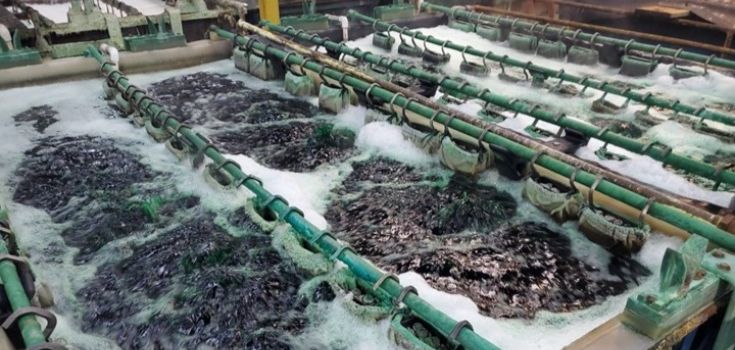
Electroplating or powder coating will prevent corrosion and improve appearance for long-term durability.
Sandstrahlen
Sandblasting will eliminate rust, oxidation, and surface contamination, preparing parts for coating and improving adhesion.
Eloxieren
Eloxieren creates an oxide layer that enhances corrosion resistance, durability, and aesthetics, especially in aerospace and structural applications.
Anwendungen der CNC-Bearbeitung von legiertem Stahl
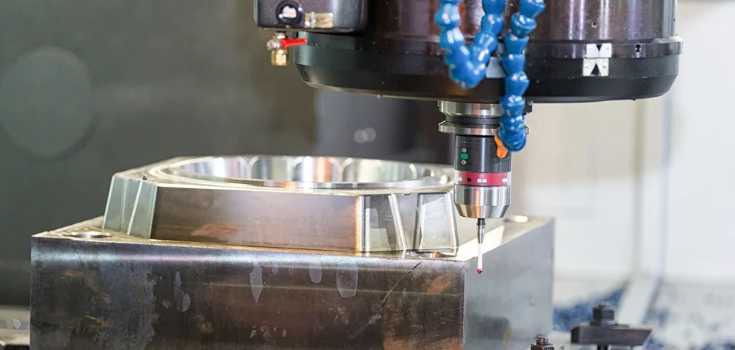
CNC-machined alloy steel is a material used across a range of applications in industries that need toughness, accuracy, and very high mechanical strength. Examples of such applications are:
- In the Automotive Industry: For the manufacture of blocks, shafts, gears, and suspension components, where there is a very high load-bearing capacity.
- In the Aerospace Sector: Ideal for turbine blades, landing gear parts, and mechanical parts subjected to severe stress and temperature.
- Energy Industry: In the production of valves, fittings, and equipment for power generation for oil, gas, and renewable energy systems.
- Industrial Machinery: General uses include making machine frames, tooling, and parts of heavy-duty equipment that need dimensional accuracy and rigidity.
- Medical Devices: Research their parts processing to make them in surgical instruments and implants where exactness and corrosion resistance matter.
- Construction Equipment: Increases use in gears, hydraulics, and mechanical joints while under continual pressure.
Every alloy steel part produced from CNC machining will have superior accuracy, stability in dimensions, plus long-term reliability. It guarantees consistency in performance under the harshest conditions.
Partnering With DEK for CNC Machining Alloy Steel
DEK is an expert in excellent CNC machining services for alloy steel parts. Every project contains skilled DFM feedback to improve manufacturability, accuracy, and performance.
With advanced milling and turning capabilities, DEK guarantees smooth, efficient, and precise production from prototype to volume manufacturing, providing customers with unmatched reliability and consistency.
Schlussfolgerung
CNC machining alloy steel provides exceptional precision, durability, and flexibility across industries. Working with DEK guarantees productive production by using advanced CNC technologies and expert DFM guidance.
Custom prototypes or large-scale production are what DEK works on to meet the world's best performance and quality standards for alloy steel products.
FAQs
Ist legierter Stahl leicht zu bearbeiten?
Alloy steel is considered tough and would require the proper tools, coolants, and machining parameters to achieve results.
Was ist der Unterschied zwischen Stahl und Eisen?
Iron is a pure element. Steel is an alloy, which means it has been mixed with carbon and other elements for greater strength and application performance.
